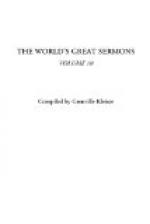MORGAN
THE PERFECT IDEAL OF LIFE
BIOGRAPHICAL NOTE
George Campbell Morgan, Congregational divine and preacher, was born in Tetbury, Gloucestershire, England, in 1863, and was educated at the Douglas School, Cheltenham. He worked as a lay-mission preacher for the two years ending 1888, and was ordained to the ministry in the following year, when he took charge of the Congregational Church at Stones, Staffordshire. After occupying the pulpit in several pastorates, in 1904 he became pastor of the Westminster Congregational Chapel, Buckingham Gate, London, a position which he still occupies. Besides being highly successful as a pulpit orator, Dr. Morgan has published many works of a religious character, among which may be enumerated: “Discipleship”; “The Hidden Years of Nazareth”; “Life’s Problems”; “The Ten Commandments.” His last work, “The Christ of To-day,” has passed through several editions.
MORGAN
Born in 1863
THE PERFECT IDEAL OF LIFE
Jesus therefore said, When ye have lifted up the son of man, then shall ye know that I am he, and that I do nothing of myself, but as the Father taught me, I speak these things. And he that sent me is with me; he hath not left me alone; for I do always the things that are pleasing to him. As he spake these things, many believed on him.—John viii., 28-30.
The Master, you will see, in this verse lays before us three things. First of all, He gives us the perfect ideal of human life in a short phrase, and that comes at the end, “the things that please him.” Those are the things that create perfect human life, living in the realm of which man realizes perfectly all the possibilities of his wondrous being—“the things that please him.” So I say, in this phrase, the Master reveals to us the perfect ideal of our lives. Then, in the second place, the Master lays claim—one of the most stupendous claims that He ever made—that He utterly, absolutely, realizes that ideal. He says, “I do always the things that please him.” And then, thirdly, we have the revelation of the secret by which He has been able to realize the ideal, to make the abstract concrete, to bring down the fair vision of divine purpose to the level of actual human life and experience, and the secret is declared in the opening words: “He that sent me is with me; my Father hath not left me alone.”




